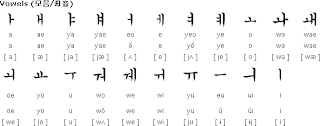This blog post will be as much a learning experience for me as I hope it will be for you.
I was sitting in a coffee shop (ok.. it was Starbucks ><) with my Korean language partner, Wan-Soo, earlier in the week going over some past papers for my Korean exam (which I had today!). He was dictating an answer to me when he said a word I didn't recognise. I asked him to repeat it, trying to work out how to spell it. Seeing my struggle, he said "yes, next put a ji-eut" ... I looked at him blankly, thinking "a what?!" ..
 |
| *This isn't me by the way.... |
When I started learning Korean, I learnt the script off a website before I went to Seoul for the first time. I practiced a bit and later, cemented the alphabet and syllable structures into my head by hours spent following hangeul subbed Korean music videos (and numerous trips to Karaoke while in Korea!).
It was only then, as I sat utterly confused in Starbucks, that I realised....I'd never actually learnt my Korean letters. I mean, I knew my letters. I could recognise them and I knew what sound they made...but I didn't actually know they're names.
I guess a similar parallel would be like saying being able to recognise the letter 'z' in a word and knowing it made a 'zzzz' sound ... but not knowing that it was referred to as 'z'. With me?
With this in mind, I vowed to take a step back and actually go and learn my letters!
At omniglot.com, I found these two fantastic little pictures which present all the consonants and vowels in the Korean script with...wait for it.... yes!...their Korean names!
Firstly, we have the consonants!
And then, the vowels!
The Korean alphabet is fantastic and really easy to learn. It was implemented in order to enable the country to attain literacy. Prior to its' invention, the Korean's had used Chinese characters to write and learning them took years of dedication and education...something most people couldn't afford - time-wise or financially.
While learning to read and write may take a bit of time, the letters themselves can be learned in a morning/afternoon (if you're ambitious) or a day (if you want a more relaxed pace!).
I now know that a "jieut" is in fact "ㅈ" or the "j" sound....
(at least that's one down...)


haha she's pretty cute...^^/
ReplyDelete(Pascal from Italki)
Great post, I often wondered if the characters had names.
ReplyDelete